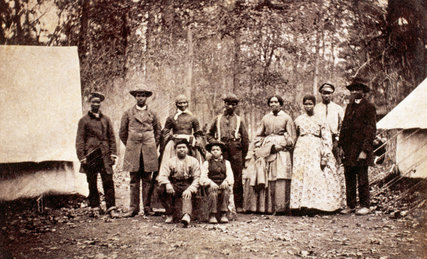Dying for Freedom
Share
Explore Our Galleries
Breaking News!
Today's news and culture by Black and other reporters in the Black and mainstream media.
Ways to Support ABHM?
By Jim Downs, the New York Times
The Emancipation Proclamation, which Abraham Lincoln signed on Jan. 1, 1863, was primarily a military tool. When he issued it in preliminary form in September 1862, it was meant to be a warning to the South: give up, or your slaves will be set free.

And, once in place, emancipation did just what Lincoln wanted — it drew untold thousands of freed slaves to the advancing Union armies, depleting the Southern work force and providing the North with much-needed cheap labor. But it also created an immense humanitarian crisis in which hundreds of thousands of former slaves died from disease, malnutrition and poverty.
Emancipation did, of course, free the slaves in the Confederacy. But Lincoln can no longer be portrayed as the hero in this story. Despite his efforts to end slavery, his emancipation policies failed to consider the human cost of liberation.
Little if any thought was given to what would happen to black people after emancipation. Questions about where they would go, what they would eat, how they would work and, most important, how they would survive the war were not considered, either by policy makers in Washington or the majority of generals in the field.
Learn the awful truth of what happened to thousands of newly freed men, women and children, here.
For some former slaves, the period after the Civil War offered new freedom.
Comments Are Welcome
Note: We moderate submissions in order to create a space for meaningful dialogue, a space where museum visitors – adults and youth –– can exchange informed, thoughtful, and relevant comments that add value to our exhibits.
Racial slurs, personal attacks, obscenity, profanity, and SHOUTING do not meet the above standard. Such comments are posted in the exhibit Hateful Speech. Commercial promotions, impersonations, and incoherent comments likewise fail to meet our goals, so will not be posted. Submissions longer than 120 words will be shortened.
See our full Comments Policy here.











So we should have left them slaves? Nothing and no one is perfect. I’m not sure those people living in slavery would have shared your opinion.
Thanks for your thoughts, Vicki. I don’t think the author of this piece meant to imply that Lincoln should not have freed the slaves, but rather that Lincoln and the Union should have thought about what would happen once thousands of enslaved people were liberated – without money, property, food, or shelter – among people who resented and disrespected the freedmen. I think the author’s reason for publishing the article was to give us an opportunity to understand how difficult it was to be set free without much further assistance.
Was I Freed or am I a black statistic amongst the dyeing free false emancipated.
I was born in 1965, and by the time I reach the third grade I had learned about the struggles of the African American in the country and the endurance of my ancestors through slavery.
It was not the stories that I read about people in the struggle that intrigued me as much as my own family’s hardship living in the south. I was groomed to respect others as well as myself, but nothing stuck with me like the emphasized point that was made to me while growing up, that I am some one that deserve everything this country offered to a white child, and I was to no matter what, demand to be treated as equal as the next person .
Emancipation Declaration: This was, however, the beginning of freedom for black Americans. The road to true freedom for African American citizens has been a long road and we, the people, still have a long way to go.
Martin Luther king said it best, “can America be trusted? “In Paragraph: 5 of kings speech he address the Nation by saying “It is obvious today that America has defaulted on this promissory note Insofar as, her citizens of color are Concerned Instead of honoring this sacred Obligation, America has given the Negro People a bad check which has come back Marked “insufficient.” (August28, 1963 Martin Luther King at Washington .D.C.)
Today in many of our big cities that have large populations of African Americans citizens there is a lack of equal justice the scale seems Brocken, leaning to the opposite side when it comes to men and women of color.(Constitution) is a legal document outlining the powers of the state and local government determined by the federal government forming a bill of rights that are formed and amended for the better of society as a whole but many are administered unequally throughout the nation we live in, and one of the more common of these amendments that is abused is the 4th: Prohibits unreasonable searches and seizures and sets out requirements for local government.8th: Prohibits excessive fines and excessive bail, as well as cruel and unusual punishment. Now the 13th, 14th, and 15th is a blow to freedom and should be looked at close and studied in details, these are known as the reconstructed amendments.
Thirteenth, Fourteenth, and Fifteenth amendments to the United States Constitution, adopted between them(13th Abolishes slavery and involuntary servitude, except as punishment for a crime (14th Defines citizenship, contains the Privileges or Immunities Clause, the Due Process Clause, (15th Prohibits the denial of suffrage based on race, color, or previous condition of servitude
Do any one that reads this understand what is really going on in your nation as a promised free citizen, and a supposedly protected class of people from unjust treatment’s and injustice. the Jim crow laws are still hear, just hidden in systemic racism Those that are soon to forget are doomed to repeat Please comment if you would like to. ( George Anthony Overstreet )